National Workforce Initiative |
In spring 2015, the organizations that make up the Social Work Leadership Roundtable tasked an advisory committee with devising a national social work workforce study encompassing all levels and fields of practice.
In recognition of the need for and importance of better data on the social work workforce, the National Workforce Initiative Steering Committee is guiding a major study of the social work workforce.
A key component of the study was a survey of a sample of recent graduates of social work degree programs. Data were collected on the backgrounds of new social workers, the jobs they took, the services they provided, the populations they served, and their experience in the job market.
On March 27, 2019, CSWE hosted a webinar on the latest survey from the National Workforce Initiative, A Discussion of the 2018 Survey of Graduates Report, as part of the CSWEducation Connections series.
Reports
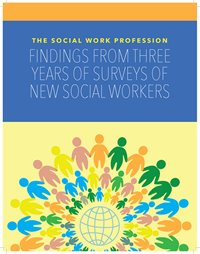 |
The fourth product of the National Workforce Initiative, The Social Work Profession: Findings from Three Years of Surveys of New Social Workers, is now available. Released in December 2020, the report presents data on where and how social workers are serving clients and communities across the country. The results are based on a sample of social workers completing their master's of social work degrees. |
.jpg?lang=en-US) |
The report on the 2018 workforce study is now available: From Social Work Education to Social Work Practice: Results of the Survey of 2018 Social Work Graduates. The report is based on survey results from 2018 graduates from more than 100 MSW and BSW programs. The purpose of this survey is to increase understanding of the job market for social workers and the demographic background of new social workers, their educational and career pathways, employment outcomes, and job satisfaction. An executive summary of the report is also available. |
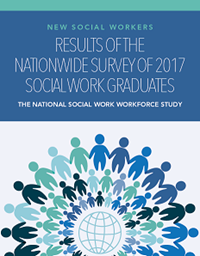 |
The second product of the workforce study was released in April 2018: New Social Workers: Results of the Nationwide Survey of 2017 Social Work Graduates. The report is an analysis of a survey of recent social work graduates, which was launched at the end of August 2017. The survey instrument addressed student demographics, employment, and perceptions of social work education and the job market. An executive summary of the report is also available. |
 |
The first product of the National Workforce Initiative, Profile of the Social Work Workforce, was released in October 2017. The report includes the size, demographic and educational backgrounds, work settings, compensation, and geographical distribution of the workforce. The analysis presented uses existing data sources, including the Bureau of Labor Statistics, the American Community Survey, and the Integrated Post-Secondary Education Data System. |
Data Briefs
In addition to the main survey reports, the National Workforce Initiative releases data briefs on specific topics. These briefs are short reports on topics relevant to social work or social work education.
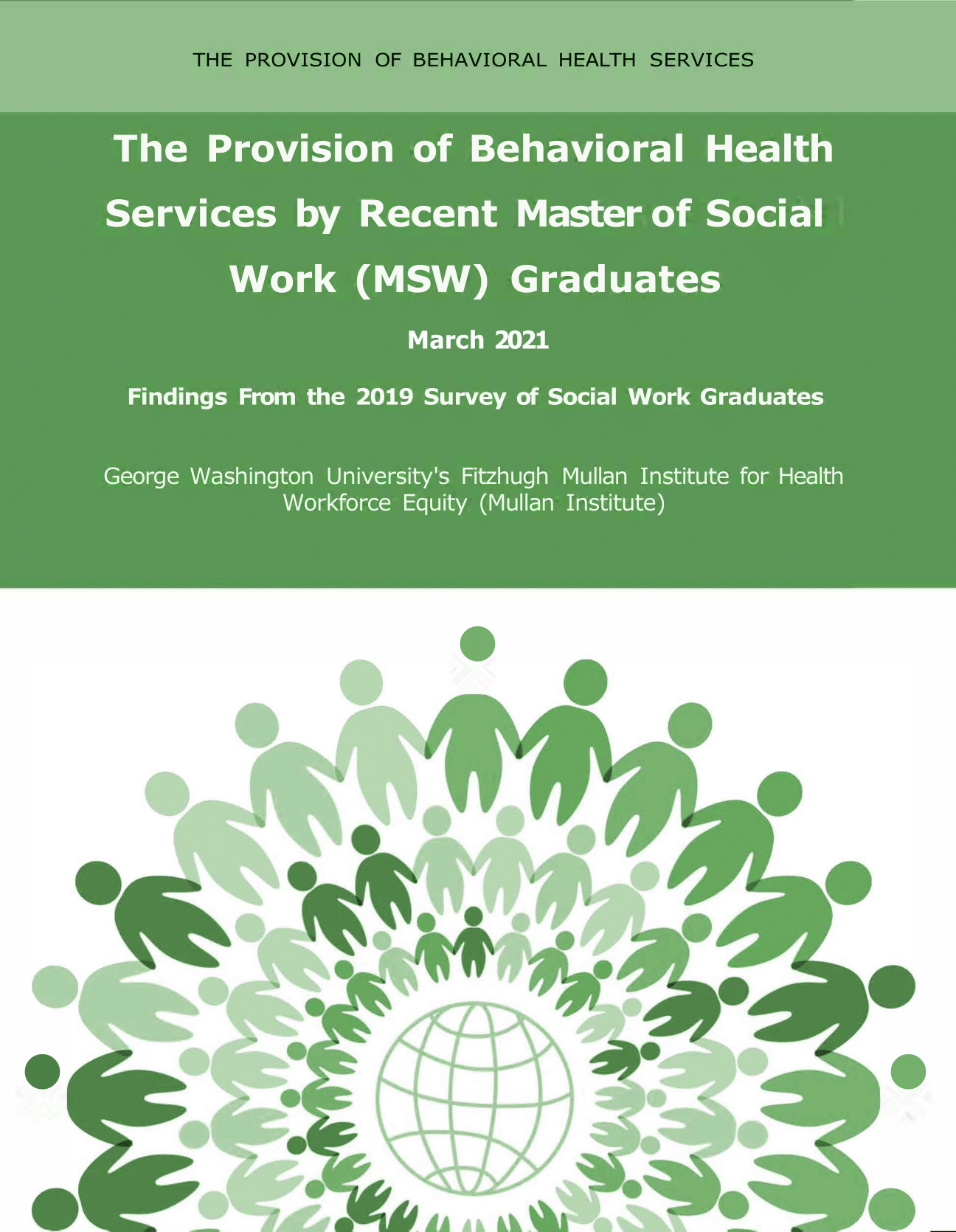 |
The Provision of Behavioral Health Services by Recent Master of Social Work (MSW) Graduates MSWs serve a wide range of vulnerable and underserved populations across different settings, according to data from the 2019 Survey of Social Work Graduates. This data brief provides insights into MSW graduates’ contributions to the behavioral health field, including information on their primary job focus, demographics, educational and occupational background, job settings, licensing or educational requirements, mean and median income, and age of clientele served. Access The Provision of Behavioral Health Services data brief here. |
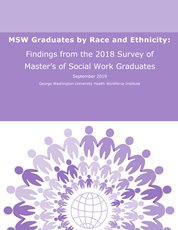 |
MSW Graduates by Race and Ethnicity Using data from the 2018 Social Work Graduates Survey, this brief provides an analysis of educational and employment outcomes by race and ethnicity. The report outlines findings related to demographics, background, employment, satisfaction, and future plans. For this report, George Washington University Health Workforce Institute compared (1) Hispanic, Black/African American Non-Hispanic, and White Non-Hispanic MSW graduates versus all MSW respondents; and (2) Asian and Pacific Islander MSW graduates versus all MSW respondents. Access the MSW Graduates by Race and Ethnicity data brief here. |
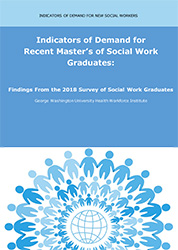 |
Indicators of Demand for Recent Master’s of Social Work Graduates Many factors influence the experience of MSW students who are searching for jobs as they complete their education. This data brief provides an analysis of the relative demand for different social work roles, responsibilities, and practice locations for recent MSW graduates. The analysis uses seven indicators to measure the supply and demand for various social work practice areas and settings. Access the Indicators of Demand for Recent Master’s of Social Work Graduates data brief here. |
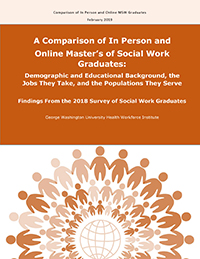 |
A Comparison of In-Person and Online MSW Graduates The number of social work students primarily receiving their social work instruction online has been growing over the past decade. This data brief compares the demographic and educational backgrounds, jobs taken, populations served, and job search experience of 2018 MSW graduates who primarily received their social work instruction in person compared to those whose instruction was primarily received online. Click here for a brief visual of the findings. Access the A Comparison of In-Person and Online Master’s of Social Work Graduates data brief here. |
Program Level Report
 |
In addition to national data, the workforce study provides program level reports to participating programs that obtain a set number of graduate participants. This report provides programs with relevant data about their graduates and how they compare to national data and to other programs based on region and auspice. An example of the program level report can be found here. |
Data Collection
Through an RFP process in fall 2016 the George Washington University Health Workforce Institute was selected by the advisory committee to conduct a study to enumerate the current social work workforce and to help design a system for ongoing collection and analysis of data. The study is composed of the following components:
- Identifying and assessing existing data sources
- Filling the most important gaps in data through a survey of new social work graduates
- Designing and piloting data collection instruments for future expanded data collection
- Recommending structures and processes for the ongoing collection and analysis of data
The National Workforce Initiative advisory committee organizational members are as follows:
- American Academy of Social Work and Social Welfare
- Association of Baccalaureate Social Work Program Directors
- Association of Social Work Boards
- Council on Social Work Education
- Group for the Advancement of Doctoral Education in Social Work
- National Association of Deans and Directors of Schools of Social Work
- National Association of Social Workers
- Society for Social Work and Research
Contact Amml Hussein with any questions about the National Workforce Initiative.
Initial funding for the Social Work Workforce Initiative was provided by each of the advisory committee organizations and the University of Southern California.
